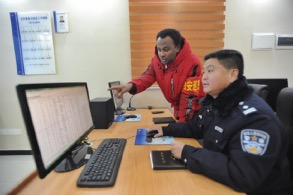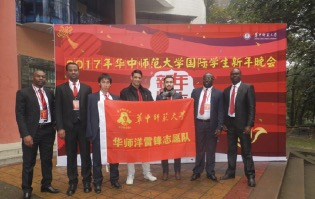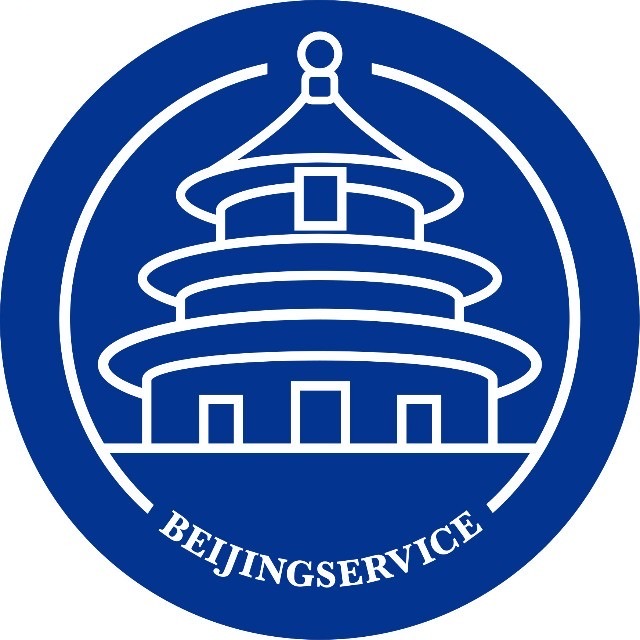Abdilahi Ismail Abdilahi (Somali). He is a Sinologist and works at Beijing Foreign Studies University. His research directions are Somali language, China-Africa relations, and African regional countries studies. He is member of the World Council of Sinologist, Beijing Language University and a research fellow at the Institute for Strategic Insights and Research (ISIR).

Many friends have asked me why I always participate in so many volunteer activities and whether I feel tired, given that volunteering is very laborious. Every time I’d like to answer: “I am tired without doubt, but the more I volunteer to do, the more I gain from it. I can gain a sense of joy and satisfaction every time I help others.” So many people helped me when I lived in China for so many years; thus, I want to help others and contribute more.
“Is there angthing I can do to help?”
While studying in Wuhan, I often served as a Spring Festival transport volunteer. The Spring Festival transport is a kind of China-specific phenomenon of the largest population migration in the world. The Chinese Spring Festival transport has a history of more than 30 years. With the rapid development of China, the services and relevant supports of the Spring Festival transport are also extensively promoted. As far as I know, many volunteers join the Spring Festival transport service team every year, and I am also honored to be one of them.

Before I became a volunteer for the Spring Festival transport, I didn’t know much about it. However, my Chinese teacher once played for us the movie “Lost on Journey,” in which there were clips about the Spring Festival transport. At that time, I thought it was very humorous and exciting, but I couldn’t understand why people had to go through all the difficulties to return home and reunite with their families before the Spring Festival.
Speaking of the first time when I served as a volunteer for the Spring Festival transport, it was the Lunar New Year’s Eve, and we gathered at 6:30 in the morning. At that time, it was still dark and frigid. We soon arrived at the train station. Many people were coming and going, all in a hurry with many bags. I had only seen these scenes on TV before and was pretty shocked when I was in it. At that time, I was mainly standing guard at the gate of Wuchang Railway Station, responsible for assisting passengers in buying tickets, giving directions, and helping with luggage. All of us were busy till 6 or 7 p.m. On the way back home, I lost my voice.
At that time, there was a fascinating story. A Chinese person could not use the self-service ticket machine. After I had helped to buy a ticket for him, he was particularly shocked and said: “A foreigner amazingly helped me to teach me how to buy a ticket.” He laughed after these words, and so did I. Some people brought their children over to chat and took pictures while waiting for the train. The most exciting thing was that the children were curious about our group of foreign volunteers. The cheerful children took the initiative to greet us, which was very cute.

I remember that once, I was assigned as a Spring Festival transport volunteer at Wuhan Railway Station (high-speed rail station). That day was not the peak period of the Spring Festival transport. There were not many people. I was mainly responsible for guiding the way outside the high-speed rail station and helping passengers with luggage. Because I am a foreigner, many people did not come to ask me for help even though I was dressed as a volunteer. For example, when I was on duty at the train station gate, I saw an uncle bypassing several Chinese passers-by to ask for directions, but I still gained no results. I couldn’t wait to help, so I asked him if there was anything I could do to help. He was shocked when he heard me speaking Mandarin, and then he calmed down and asked me for directions. When I told him how to get there, he was shocked, saying that a foreigner knew more than him, a Chinese, and he laughed self-deprecatingly and thanked me repeatedly. When I finished volunteering and went home that day, I met an auntie at the bus stop looking at the stop sign with several big bags. I could see that she was a little confused about finding the right bus and wanted to ask others for help, but at that time, only me and she were on the platform. She looked at me, and I looked at her, and finally, I asked her: “What’s the matter? Do you need my help?” She seemed very happy to hear me speaking Chinese and asked me enthusiastically: “You speak Chinese so well! How long have you been in China?” After I answered her question, she told me she didn’t know which bus to take to Hankou Railway Station. I listened to her needs and quickly told her which bus to take and which stop to get off. She took my hand and said thank you several times, and she didn’t forget to wish me a Happy New Year before getting on the bus.
The winter in Wuhan was frigid, and the wind was mighty that day. Although I wore a hat, gloves, and a scarf, when I was doing volunteer work outdoors, I still felt like I was going to be frozen into a popsicle. Still, I encountered many simple, enthusiastic, lovely, and shy people. I received many sincere thanks, kind encouragement, praise, and warmth, which kept me warm all day and made me feel that the winter in Wuhan was not so cold.
By serving as a volunteer for the Spring Festival transport, I not only experienced the joy of helping others but also experienced the Spring Festival transport from a unique perspective. When I saw with my own eyes so many people crowded, carrying big and small bags, and some were holding their children, I could also feel the anticipation and joy in their hearts of seeing their family members from the smiles on their faces and their words. However, it was an arduous journey. I think the essence of human beings is actually in common. We all yearn for a happy life with a family reunion and good health. Just as Marx said, the pursuit of the beauty of harmony is human instinct. Spring Festival transport is like a vivid sand painting of Chinese people’s dream of a happy life.
I also worked as a traffic volunteer in which, during the morning rush hour, at the traffic lights at the intersection, I wore volunteer clothes and hats and carried a small red flag to maintain traffic order. In the beginning, I would feel embarrassed when the kids after school looked at us. Especially when I was patrolling the streets, I was often timid. I used to see people holding flags and wearing red vests on the side of the road before. I didn’t know their jobs then, and I felt that it was tough for them to keep standing to protect the traffic safety of pedestrians. After becoming a traffic volunteer, I understand their hard work better. Now in Beijing, I also accompany my children to school every morning. I feel a close relationship when seeing the volunteers, and I often greet one uncle volunteer, and we become friends.
Be a person like Lei Feng
When I was a volunteer at the police station, the first dispute I dealt with was that two Congolese students accidentally spilled coffee on a passing Chinese while drinking in a coffee shop. They apologized to the Chinese, but they couldn’t understand each other’s language, so they misunderstood each other, which intensified the conflict, and thus they called the police. After arriving at the police station, I helped them translate, explain the misunderstanding, and finally, they reconciled. They all thanked me very much.
This is the first time I have dealt with such a conflict. This coordination made me realize that the language barrier could easily lead to misunderstandings. Therefore, following the original intention to help foreigners live more smoothly in China, I persevered on the road of volunteering. Although many mediations are related to minor conflicts and small troubles, I am very proud. I feel accomplished whenever I help others solve problems, as if I am a bridge between foreigners and Chinese.
Later, because I participated in volunteer work many times, I was selected as “Foreign Lei Feng” by the university. At that time, I didn’t know what the three words “ Foreign Leifeng” meant, nor did I know the meaning behind these three words. I thought this certificate was the same as the certificate I got as a volunteer before, which is just an ordinary certificate of merit, so I didn’t particularly care about it. Later, when chatting with a Chinese friend, I inadvertently mentioned winning the “ Foreign Leifeng” award. His eyes immediately changed when he looked at me and said with admiration: “Then you must be very accommodating. “ I didn’t quite understand his reaction when he just heard me say that I got the “Foreign Leifeng” volunteer award. Why did he say I’m amazing, given I haven’t told him what I did? My friend noticed my confusion and asked, “Do you know who Lei Feng is?” I said I didn’t know. He was so shocked that he started to introduce to me who Lei Feng was. It turned out that the person printed on the back of the red vests I often saw on the streets, campuses, stations, and other places was Lei Feng!
My Chinese friends told me that although Lei Feng is just an ordinary person in China, he has done many good things and helped many people in his life, so he has a special place in the hearts of Chinese people. From the elderly to the children, every Chinese knows about Lei Feng. China also sets up March 5th every year as the “Day of Learning from Lei Feng” to encourage everyone to learn from Lei Feng and do more good deeds. After listening to the story of Lei Feng, I was not only shocked but had admiration. I admired Lei Feng’s behavior of doing good deeds without leaving his name, and I was also moved by the Chinese people’s memory of his behavior. Sima Qian, a famous historian in ancient China, once wrote in his book Historical Records: “Man is inherently dead, or heavier than Mount Tai, or lighter than a feather.” The general idea is that each of us will go to the end of life, but the value of each person’s life is different. For those people who have made significant contributions to society, the world will remember them after their death. We cannot decide the length of life, but we can broaden the depth of life. We can learn from Lei Feng, help others more, contribute our strengths, and make our lives more valuable.
Teaching experience in Northwest China
After leaving the post-doctoral station, I chose to become a teacher. My experience of volunteer teaching in Northwest China many years ago prompted me to enter the teaching position. At that time, it was an activity organized by my university. My compatriots and I and our two Chinese classmates signed up to participate. A group of four set off for Haishiwan, Honggu District, Lanzhou City, Gansu Province. I had just come to China at that time, and my Chinese was not very good, but I was full of curiosity about China and wanted to know more. The passengers on the train were also interested in us. Our compatriots could speak good Chinese, so we chatted with them. Some people asked us where we were going by train. When they heard that we were going to teach in Haishiwan, people gave us thumbs up and said: “It’s amazing that foreigners actually go to such remote places to teach.”
After getting off the train, someone from the school came to pick us up. We took the car for a few hours and walked on a small road for a while. It was already dark, and it was apparent that the temperature here was relatively low. Fortunately, before setting off, I was especially reminded by the Chinese students to bring jackets. It was July, and the heat in Wuhan was unbearable, while the night here was chilly. We settled in the local dormitory specially prepared for us, right next to the school. I tossed and turned, thinking about the children we were about to meet. The next day I deliberately got up early. As soon as I opened the door, six or seven children were already around my room, looking at me curiously and then excitedly saying to their partners, “Wow! Foreigners!” Some children greeted me timidly by saying “Hello” to me. I looked at them and deliberately said “Hello” in Chinese. The children were even more shocked: “Wow! He can speak Chinese.” After discovering this, the children became more courageous and shook hands with me to say hello. Because of the children’s enthusiasm, I asked them what their names were, how old they were, what grades to go to, etc., and then the children were reluctant to leave for class.
I taught English classes in grades 1, 2, and 3, two to three types a day, four days a week. There was one class in each grade, 30 children in a class, and a total of more than 90 children were taught. I had been teaching the children since 8 a.m. As soon as I entered the classroom, I could feel the enthusiasm of the children, who kept greeting me. I taught them relatively simple English, like the alphabet, hello, and what’s your name. Some children had studied, and some had not. When I asked questions, the children were very positive. Every child raised their hands and shouted “me, me, me”; some children even stood up excitedly. The kids also surrounded me after class and didn’t want me to leave the classroom. Although the children’s English level was ordinary, they kept trying to talk to me in English, including while eating lunch in the cafeteria. Later, when I visited their home, I learned that most of them were left-behind children. Their parents went out to work, and those children stayed home with their grandparents. I thought they must be very lonely in their hearts, so they relied on me like a brother.
When setting off from Wuhan, We carried many gifts donated by people such as schoolbags and clothes to the children. Four of our classmates were divided into two groups. When we were not in class, we were responsible for visiting a child’s home every day and giving gifts. After that, we went home with the students. There were no buses or bicycles for the children to go home. They walked on foot. We walked for more than half an hour before we arrived at the students’ home. The soil here was red, but the ground was sprinkled with water, and there was little dust. The door of each house was massive, and when you entered the door, you could see the sheep fold and cow fold next to it. Most homes were made of mud, and the beds were also made of earth, which was called “Kang” in the local area. Most families have only grandparents with children. The Chinese classmates introduced to them that we were international students from Wuhan. The student’s families were embarrassed to talk to me at first, but they were very enthusiastic. They immediately boiled water, poured tea, and cooked for us. We didn’t want to bother them, saying we would go to other students’ home. Finally, we were afraid that the time would be too late and did not want to bother to cook, so we had to leave. Those grandparents took our hand, said thanks, and reluctantly sent us away. My heart had always been warm on the way back.
At that time, I had just been in China for over a year. I thought that China was as modern as Wuhan everywhere, and I didn’t know much about China. The first time I came to Haishiwan, I saw in person the Chinese countryside. Although the living conditions here are relatively plain, the people are simple and enthusiastic and work hard for a better life. Some people in the town heard that we came to the school to teach, and specially came to invite us to dinner, and prepared a lot of dishes. This is the first time I have received such a warm reception in China. I feel like I’m back home. When I was shopping for clothes in the town, the shop owner was very kind to us after knowing that we were volunteers, and even gave us a discount.
We taught English in Haishiwan for more than a month. While the summer vacation was ending, we could only reluctantly say goodbye. The children gave me a lot of gifts, such as flowers and bracelets. There was an older child who asked for my QQ account. Later, he kept sending messages on QQ, asking whether I could come next semester and when. On the way back I told myself to go back and see the kids if I had the chance. Because my Chinese level was not very good when I volunteered then, I felt a little ashamed and thought I was not very helpful to the students. I can teach them more knowledge if I can speak better Chinese. Although I only stay in Haishiwan for over a month, the experience is still fresh in my memory. The memories are warm and moving. I still remember the names of every child and the kindness that people there gave us along the way. This experience enables me to have a deeper understanding of China, inspires me to go further on the road of volunteering, and gives me firm confidence in the profession of teaching.
Source: International Talent 2022年第10期
Events
More+-

2026 'Win in Suzhou Win the Future' Global Entrepreneurship Competition starts registration
-

Shanghai Auto Culture Festival to rev its engine in March
-

More Awesome Upcoming Events in Shanghai
-

Cherry Blossoms for Marathon in Spring, Lotus for River Crossing in Summer, Osmanthus for Tennis in Autumn, Plum Blossoms for Ice and Snow in Winter – Wuhan's 2026 Sports Events Promise Non-Stop Excitement
-

Top Spring Festival Events to Catch in the City











 京公网安备
京公网安备